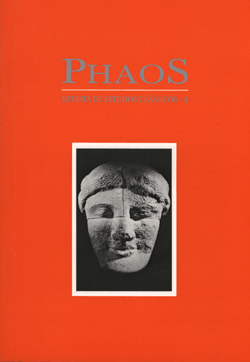Resumo
This work is an attempt to anaIyse the behaviour and function of the notion of pater in three texts of the Augustan period (Aeneis, Res gestae and the building transformation carried out by the princeps). We aim to determine how the use of this notion shows a "paternalization" process of the power which is the basis of the cultural transformation stating the instauration of the principate.Referências
ADCOCK, F. D. "The Interpretation of Res gestae Divi Augusti” (34.1). Classical Quarterly I, pp. 130-135, 1951.
BENVENISTE, É. Le vocabulaire des institutions indo-européennes. Paris: Editions de Minuit, 1969.
BÉRANGER, J. Recherches sur l'aspect idéologique du principat. Paris: Basel, 1953.
BOYLE, A. J. The Chaonian dove. Studies in the Eclogues, Georgics and Aeneid of Virgil. Leyden: Brill, 1986.
CONTE, G. B. "Saggi d'interpretazione dell'Eneide: ideologia e forma del contenuto". Materiali e discussione per l'analisi dei testi classici 1, pp. 11-48, 1978.
CONTE, G. B. The rhetoric of imitation. Genre and poetic memory in Virgil and other Latin poets. Cornell University Press, 1986.
DUNKLE, J. R. "The Greek Tyrant and Roman Political Invective of the Late Republic". Transactions of the American Philological Association XLVIII, pp. 151-171, 1967.
EHRENBERG, V. and JONES, A. H. M. Documents illustrating the reigns of Augustus and Tiberius. Oxford University Press, 1979.
ERNOUT, A. et MEILLET, A. Dictionnaire étymologique de la langue latine. Histoire des mots. Paris: Klincksieck, 1959.
GALINSKY, K. Augustan culture. Princeton University Press, 1996.
GETTY, R. "Romulus, Roma and Augustus in the sixth book of the Aeneid”. Classical Philology XLV, pp. 1-12, 1950.
HABINEK, T. “Ideology for an empire in the prefaces to Cicero's dialogues”. In: BOYLE, A. J. (ed.) Roman literature and ideology. Bendigo, 1995, pp. 55-67.
HABINEK, T. The politics of Latin literature. Writing, identity and empire in ancient Rome. Princeton University Press, 1998.
HARRISON, S. J. "Vergil on kingship: the first simile of the Aeneid”. Proceedings of the Cambridge Philological Society 34, pp. 55-59, 1988.
HELLEGOUARC'H, J. Le vocabulaire latin des rélations et des partis politiques sous la République. Paris: Les Belles Lettres, 1965.
LA PENNA, A. "La lirica civile d'Orazio e I'ideologia del principato". Maia XIII, pp. 209-245, 1961.
LESUEUR, R. "Latinus ou la paternité manquée (Énéide, VII-Xll)". Révue des Études Latines 57, pp. 231-253, 1980.
LIOU-GILLE, B. Cultes "héroïques" romains. Les fondateurs. Paris: Les Belles Lettres, 1980.
LLOYD, R. "The character of Anchises in the Aeneid”. Transactions of the American Philological Association XXXVIII, pp. 44-55, 1957.
MASCHIN, N. A. El principado de Augusto. Madrid: Akal, 1978.
MYNORS, R. Virgil. opera. Oxford: Clarendon Press, 1969.
PINA POLO, F. Contra arma verbis. El orador ante el pueblo en la Roma tardorrepublicana. Zaragoza: Instituto "Fernando el Católico", 1997.
PORTE, D. "Romulus-Quirinus, prince et dieu, dieu de princes. Étude sur le personnage de Quirinus et sur son évolution, des origines à Auguste". Aufstieg und Niedergang der Römische Welt II 17.1, pp. 300-342, 1981.
ROWLER, H. "Vergil and the Forum of Augustus". American Journal of Philology, pp. 261-276, 1941.
ROYO ARPÓN, J. M. Palabras con poder. Barcelona: Marcial Pons, 1997.
SABLAYROLLES, R. "Espace urbain et propagande politique: l'organisation du centre de Rome par Auguste (Res gestae, 19 à 21)". Pallas XXVII, pp. 59-77, 1981.
SALMON, E. T. "The evolution of Augustus' principate". Historia V, pp. 456-478,
SAUVAGE, A. "Les éléments du prestige, le fonctionnement et la nature du pouvoir d'Énée". Révue des Études Latines, pp. 204-230, 1980.
THOMAS, Y. Los artificios de las instituciones. Estudios de derecho romano. Buenos Aires: EUDEBA, 1999.
WALLACE-HADRILL, A. " Mutatio morum: the idea of a cultural revolution". In: HABINEK, T. & SCHIESARO, A. (ed.) The Roman cultural revolution. Cambridge University Press, 1997, pp. 3-22.
WILLIAMS, G. Change and decline. Roman literature in the Early Empire. Berkeley University Press, 1978.
WIRSZUBSKI, Ch. Libertas as a political idea at Rome during the Late Republic and Early Principate. Cambridge University Press, 1960.
ZANKER, P. Augusto y el poder de las imágenes. Madrid: Alianza, 1992.

